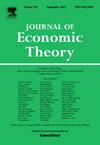没有预期效用的游戏动态一致性
IF 1.2
3区 经济学
Q3 ECONOMICS
引用次数: 0
摘要
在动态博弈中,我们感兴趣的是玩家偏好的条件,这意味着动态一致性和顺序最优策略的存在。后者意味着该策略在每个玩家的信息集合中都是最优的。为了探索这些属性,我们按照Gilboa和Schmeidler(2003)和Perea (2025a)的假设,每个玩家都有一个条件偏好关系——一个映射,它赋予每个关于对手策略的概率信念一个相对于自己策略的偏好关系。我们分别确定了保证动态一致性和顺序最优策略存在的条件偏好关系的一组非常基本的条件。这些条件是由假设预期效用隐含的,但比假设预期效用弱得多。此外,在我们的框架中,非期望效用与动态一致性和结果主义是相容的。本文章由计算机程序翻译,如有差异,请以英文原文为准。
Dynamic consistency in games without expected utility
Within dynamic games we are interested in conditions on the players' preferences that imply dynamic consistency and the existence of sequentially optimal strategies. The latter means that the strategy is optimal at each of the player's information sets, given his beliefs there. To explore these properties we assume, following Gilboa and Schmeidler (2003) and Perea (2025a), that every player holds a conditional preference relation – a mapping that assigns to every probabilistic belief about the opponents' strategies a preference relation over his own strategies. We identify sets of very basic conditions on the conditional preference relations that guarantee dynamic consistency and the existence of sequentially optimal strategies, respectively. These conditions are implied by, but are much weaker than, assuming expected utility. Moreover, it is shown that non-expected utility is compatible with dynamic consistency and consequentialism in our framework.
求助全文
通过发布文献求助,成功后即可免费获取论文全文。
去求助
来源期刊

Journal of Economic Theory
ECONOMICS-
CiteScore
2.50
自引率
12.50%
发文量
135
期刊介绍:
The Journal of Economic Theory publishes original research on economic theory and emphasizes the theoretical analysis of economic models, including the study of related mathematical techniques. JET is the leading journal in economic theory. It is also one of nine core journals in all of economics. Among these journals, the Journal of Economic Theory ranks fourth in impact-adjusted citations.
 求助内容:
求助内容: 应助结果提醒方式:
应助结果提醒方式:


